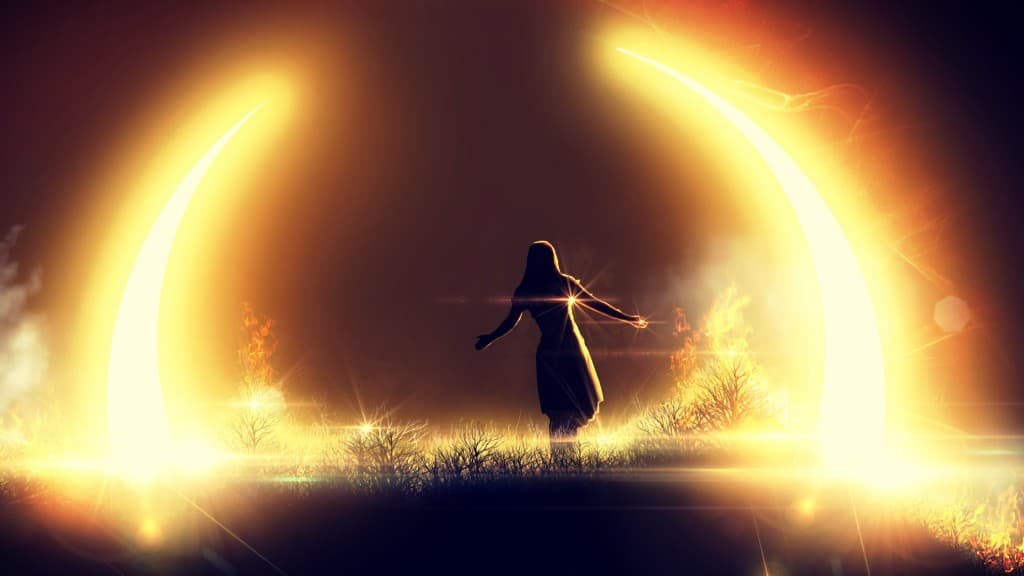Eclipses, phenomena that briefly darken our world, offer more than just a visual spectacle. They are reminders of the interconnectedness between Earth and the cosmos, and how they have influenced our perception, culture, and scientific knowledge throughout history.
Between Mythology and Science: The Fascination with Eclipses
Eclipses are not merely celestial spectacles; they impact our planet in profound and surprising ways. For instance, when day briefly turns to night, we experience an unexpected drop in temperature. This phenomenon reminds us of how connected our world is to celestial bodies.
Moreover, the reduction in solar radiation changes our perception of the environment, creating unique experiences that have been a source of wonder and speculation throughout history.
Over the centuries, cultures around the world have interpreted eclipses in wonderfully diverse ways. The Egyptians imagined a mythological pig devouring the Moon; the Mayas believed a jaguar was attacking the Sun; and in China, people thought a celestial dragon was responsible for the solar darkness, performing rituals to scare away this creature and recover the light.
These stories, though we know them not to be literal today, reflect a deep connection between humanity and the cosmos, showing how our ancestors sought to understand and explain the universe’s mysteries.
With the advancement of science, we have been able to move beyond these mythic interpretations and understand eclipses from a scientific perspective. This progress not only shows how far we have come in our knowledge of the universe but also underscores our continuing fascination with these phenomena.
Science has allowed us to replace fear with admiration and respect, showing us that behind every eclipse lies a unique opportunity to observe and learn about the mechanisms governing the cosmos.
The Impact of Eclipses on Health and Society
Eclipses have not only captured our imagination but also generated a series of beliefs about their impact on health and society. In ancient times, it was thought that these astronomical phenomena could directly influence people’s well-being.
For example, there was a widespread belief that pregnant women should avoid exposure to eclipses to prevent birth defects or marks on their children. Moreover, it was advised to stay indoors to protect oneself from the negative energies supposedly emanating from these events.
Today, we understand that eclipses are natural phenomena, whose only direct influence is the temporary reduction of sunlight. Far from being omens of bad luck or causes of health problems, eclipses provide us with unique opportunities for scientific observation and collective wonder.
Education plays a crucial role in this change of perception. By learning about the nature and causes of eclipses, society can replace fear and superstition with knowledge and admiration.
This process not only fosters a greater understanding of the universe but also teaches us to appreciate the precision and beauty of natural phenomena. In this way, science becomes a powerful tool for transforming ancient beliefs and promoting a deeper respect for the wonders of nature.
The Light of Truth About Eclipses
The evolution of our understanding of eclipses marks an illuminating journey. We have moved from the darkness of fear and superstition to the light of knowledge and curiosity. Throughout the centuries, these celestial events have been a powerful reminder of our place in the vast universe and our relentless pursuit to unravel the mysteries that surround us.
Science has played a crucial role in this journey, clearing the shadows that once enveloped eclipses and allowing us to appreciate them not only as impressive natural phenomena but also as opportunities to better understand the fundamental principles of astronomy.
This discovery process reflects a broader aspect of the human condition: our ability to overcome ignorance through the relentless pursuit of knowledge. In a world where the unknown is often met with fear, eclipses teach us the importance of education and scientific research.
These tools enable us to enrich our perception of the world and transform fear into fascination and respect.
Each eclipse, then, becomes an invitation to look up at the sky. Not just to observe an astronomical event, but to remember the long path we have traveled from ancient mythological explanations to profound scientific understanding.
These moments, though fleeting, unite us in a shared experience of awe and admiration for the forces that shape our universe. They inspire us to continue exploring, learning, and, above all, marveling at the immense beauty and complexity of nature.

